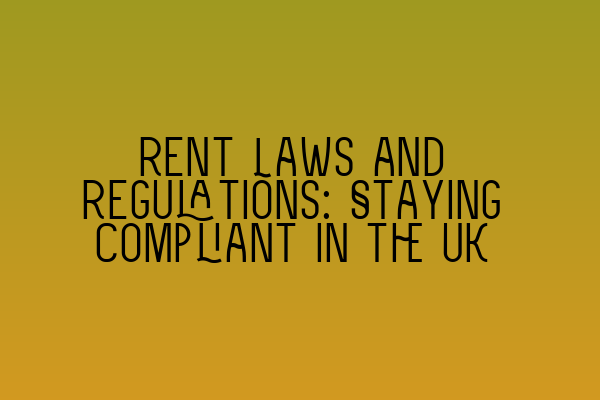Rent Laws and Regulations: Staying Compliant in the UK
Renting property in the UK can be a lucrative investment, but it also comes with a host of legal responsibilities. As a landlord or tenant, it’s crucial to stay compliant with the rent laws and regulations to ensure a smooth and hassle-free rental experience. In this article, we will explore the key legal aspects that both parties need to be aware of, and offer some helpful tips on staying compliant in the UK rental market.
Know Your Rights and Responsibilities
Before diving into the nitty-gritty of rent laws and regulations, it’s essential for both landlords and tenants to understand their rights and responsibilities. In the UK, there are specific laws in place to protect the interests of both parties. Landlords have the right to receive rent on time, maintain the property in a safe and habitable condition, and serve proper notice when terminating a tenancy. Tenants, on the other hand, have the right to live in a property that meets certain standards, privacy, and protection against eviction without proper cause.
To ensure a smooth and fair rental experience, it is vital for both parties to familiarize themselves with the laws governing their rights and responsibilities. Landlords and tenants can benefit from seeking legal advice or referring to informative resources like SQE Property Law & Land Law. These resources provide comprehensive information on rent laws and regulations, helping both parties understand their legal obligations and avoid any potential disputes.
Key Rent Laws and Regulations in the UK
Now that you understand the importance of knowing your rights and responsibilities, let’s delve into some of the key rent laws and regulations in the UK:
1. Housing Act 1988 and 1996
The Housing Act 1988 and 1996 provide the legal framework for most tenancies in England and Wales. These acts outline the rights and obligations of both landlords and tenants, including rules on rent increases, eviction processes, and security deposits. It is crucial for landlords and tenants to be familiar with these acts to ensure compliance and avoid any legal issues.
2. Tenancy Deposit Protection
Under the Housing Act 2004, landlords in the UK are required to protect their tenants’ deposits in a government-approved deposit protection scheme. This scheme ensures that tenants’ deposits are secure and provides a fair and independent resolution process for any disputes that may arise at the end of the tenancy. Landlords must protect the deposit within 30 days of receiving it and provide tenants with the prescribed information about the deposit protection scheme within the same timeframe.
3. Gas Safety Regulations
Landlords have a legal obligation to ensure that any gas appliances provided in their rental properties are safe for use. According to the Gas Safety (Installation and Use) Regulations 1998, landlords must have an annual gas safety check conducted by a Gas Safe registered engineer. A Gas Safety Certificate must be issued to the tenants within 28 days of the check or before they move in. Failure to comply with these regulations can have severe consequences, including fines and potential criminal charges.
Tips for Staying Compliant
Now that you are aware of some of the key rent laws and regulations in the UK, here are some helpful tips for staying compliant:
1. Stay Informed
Keep yourself updated with any changes or updates in rent laws and regulations. Regularly check reliable sources like SQE Property Law & Land Law for the latest information. Staying informed will help you avoid unknowingly breaching any regulations.
2. Document Everything
Keep thorough records of all communications, agreements, inspections, and repairs related to the rental property. Documentation can be crucial evidence in case of any disputes or legal issues that may arise in the future.
3. Seek Professional Advice
If you’re unsure about any aspect of rent laws and regulations, don’t hesitate to seek professional advice. Consulting with a solicitor specializing in property law can provide valuable insights and help you navigate any complex legal matters.
4. Maintain the Property
Landlords must ensure that the rental property is maintained in a safe and habitable condition. Regular inspections, timely repairs, and addressing tenants’ concerns promptly are essential for compliance with rent laws and regulations. Not only does this ensure tenant satisfaction, but it also helps avoid potential legal issues.
5. Carry Out Proper Background Checks
As a landlord, it is crucial to carry out thorough background checks, including credit checks, previous rental history, and employment verification, before accepting a new tenant. This helps ensure that you are renting to responsible and reliable individuals, reducing the risk of potential problems down the line.
By following these tips and staying up to date with rent laws and regulations, landlords and tenants can ensure a mutually beneficial and compliant rental experience in the UK.
For more information on rent laws and regulations, you can explore the following related articles:
